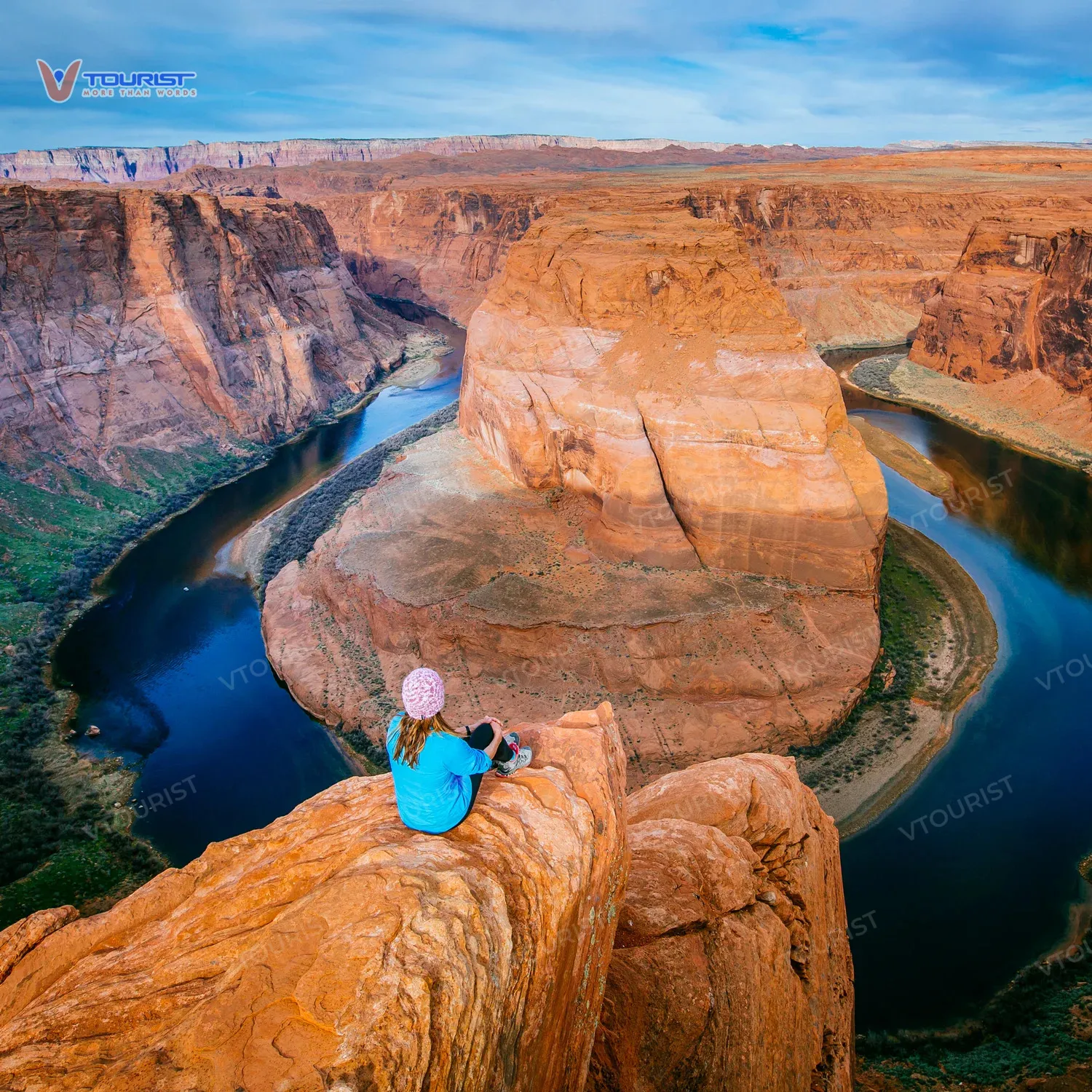Arizona, famed for its sprawling deserts and majestic canyons, is not only a natural wonder but also a living museum of unique architecture. From structures sculpted by time to impressive modern creations, Arizona offers an exciting journey of architectural discovery.
Horseshoe Bend: Nature’s Architectural Masterpiece
Arizona, a land of marvels, is home to Horseshoe Bend, a powerful testament to nature’s architectural prowess. This horseshoe-shaped canyon, carved by the Colorado River over millions of years, is an unmissable destination when traveling through Arizona.

Unique Architecture from the Flow of History: Horseshoe Bend is more than just a canyon; it’s a natural sculpture where the Colorado River has tirelessly eroded and shaped towering cliffs. This river, in its journey of over 2,300 km, has created countless wonders, with Horseshoe Bend standing out as one of the most remarkable masterpieces.
Majestic and Sacred Beauty: With cliffs nearly 300 meters high embracing the winding river, Horseshoe Bend evokes a sense of awe and reverence. The combination of pristine natural beauty and the peculiar horseshoe shape creates a mystical space, where time seems to pause to admire the grandeur of creation.
Cliffs Telling Tales of History
The cliffs of Horseshoe Bend are not just lifeless rocks, but living pages of history, recording millions of years of geological events.

Formation Journey Through the Tertiary Period: The red sandstone layers, formed from the Tertiary period, are the result of sand and mineral deposition in an arid environment, subsequently compressed and hardened. Erosion by water and wind has sculpted unique patterns and shapes, creating the canyon’s distinctive beauty.
Earth’s Transformations: The continuous changes in the rock layers reflect Earth’s transformations through geological eras, from ancient oceans to arid deserts. Studying the geology of Horseshoe Bend not only provides aesthetic knowledge but also offers deep insights into the planet’s history.
Glen Canyon Dam: Harmony Between Engineering and Nature
Not far from Horseshoe Bend, Glen Canyon Dam emerges as a symbol of engineering prowess and the harmonious blend of humanity and nature.

A Monumental Architectural Achievement: Completed in 1966, Glen Canyon Dam stands 216m high and 300m long, creating Lake Powell, one of the largest artificial lakes in the United States. The dam not only provides water and hydroelectric power but also serves as a magnificent viewpoint.
Unique Contrast: From atop the dam, visitors can admire the stunning combination of the turquoise waters of Lake Powell and the vibrant red rock mountains. The contrast between natural and man-made elements highlights the area’s beauty, creating a majestic and captivating landscape.
Antelope Canyon: Architecture of Light and Stone
Antelope Canyon, also known as the Corkscrew Canyon, located about a 15-minute drive from Horseshoe Bend, is another architectural masterpiece of Arizona.

Narrow Slot Canyon with Breathtaking Beauty: This narrow canyon is famous for its stunning light beams and unique rock formations. Sunlight filtering through the canyon’s openings creates surreal shapes and colors, making Antelope Canyon one of the most photographed spots in Arizona.
The Magic of Light: The interplay of red rocks and natural light creates a mystical and alluring space. Every angle, every moment in Antelope Canyon is a unique work of art, leaving visitors in awe of nature’s gifts.
Other Destinations Near Horseshoe Bend
Beyond Horseshoe Bend, the area offers many other attractive tourist destinations:
- Lake Powell: A vast artificial lake, about a 30-minute drive from Horseshoe Bend, is ideal for recreational activities such as boating, fishing, and exploring the unspoiled beauty of Arizona.
- Grand Staircase-Escalante National Monument: This national monument, about a 1 hour and 30-minute drive from Horseshoe Bend, is notable for its diverse terrain and majestic scenery.
- Paria Canyon: Approximately a 1-hour drive from Horseshoe Bend, Paria Canyon is famous for its bizarre rock formations and wild landscapes.
Experiencing Horseshoe Bend Tourism: Tips and Notes
To have a fulfilling trip to Horseshoe Bend, keep the following in mind:
Ideal Time to Visit: Spring and autumn are the best times to visit, with mild weather and beautiful natural landscapes. Early mornings and late afternoons are ideal for avoiding crowds and admiring the stunning sunrise or sunset.
Preparation: Wear comfortable shoes for walking on sand and rocks. Don’t forget to bring water, sunscreen, and a hat to protect your skin from the intense sun.
Safety: Be careful when taking photos near the cliff edges and follow safety rules to prevent accidents.
Environmental Protection: Maintain cleanliness and adhere to environmental protection regulations to preserve the beauty of Horseshoe Bend for future generations.
Conclusion
Arizona is not only a famous tourist destination with magnificent natural landscapes but also a unique architectural museum where visitors can discover structures created by both nature and humans. From Horseshoe Bend to Glen Canyon Dam and Antelope Canyon, each location offers a distinct beauty, contributing to the richness and diversity of Arizona’s architecture. Come and experience to feel the wonder of this land!